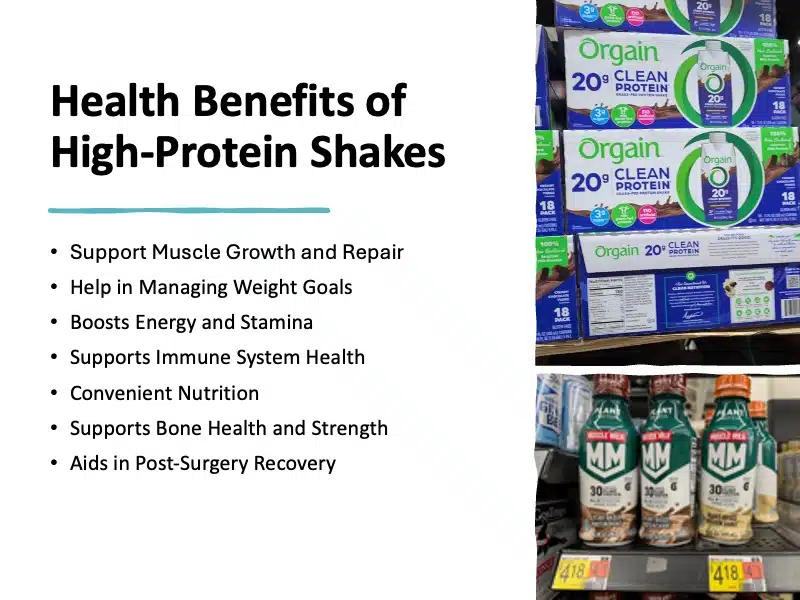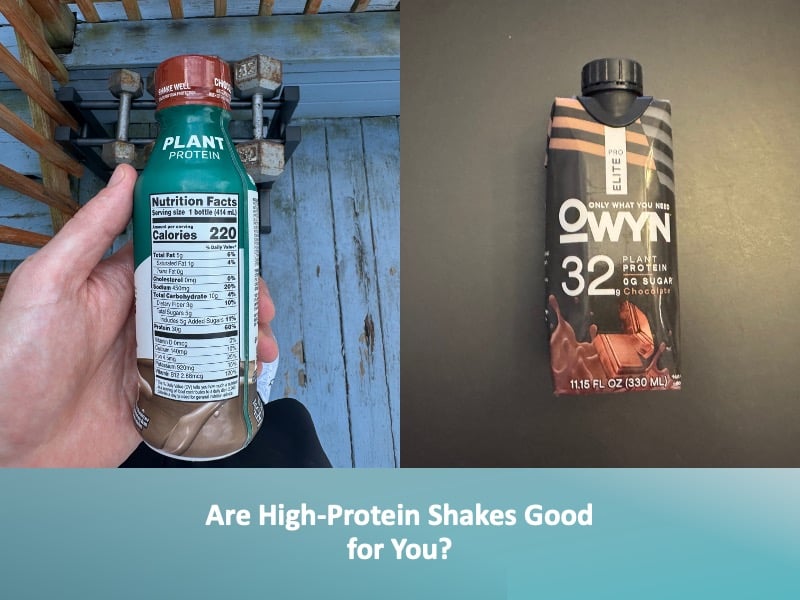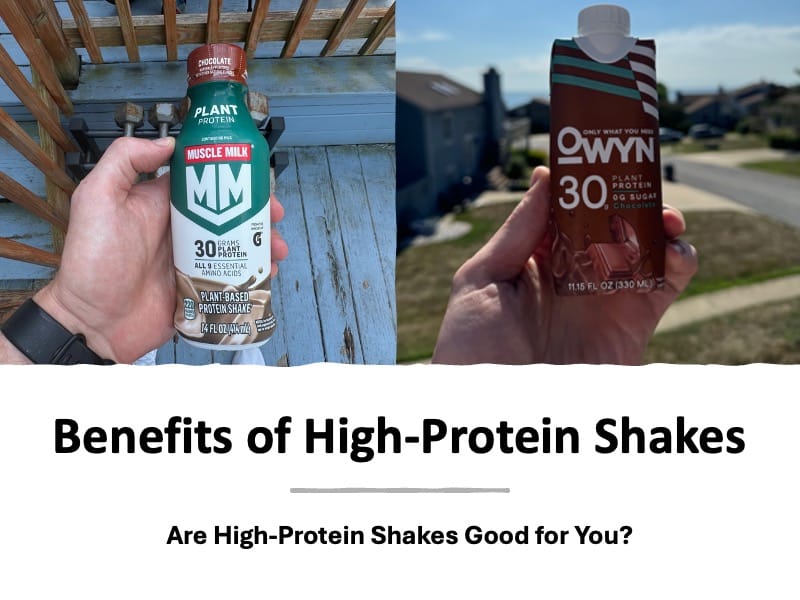Benefits of High-Protein Shakes: Are They Good for You?
The benefits of high-protein shakes extend far beyond muscle building, as they offer a convenient and effective way to support recovery, improve satiety, and increase overall nutritional intake for active individuals and busy lifestyles.
High-protein shakes have been part of my routine since college, when I carried Muscle Milk between classes to fuel training and recovery.
Currently, my favorite high-protein shakes are the OWYN shakes from BJ’s in the United States, as each one is packed with 30 grams of clean, plant-based protein.
They are a convenient, reliable way to meet my body’s increased protein demands.
For anyone balancing a demanding schedule, engaging in regular exercise, or aiming to support recovery and muscle health, high-protein shakes offer a practical solution to increase protein intake.
Dietary protein is essential for muscle protein synthesis, tissue repair, enzyme function, immune support, and metabolic health, and adding high-protein shakes to your daily diet can help improve muscle maintenance, regulate appetite, stabilize energy levels, and support lean body mass.
What Are High-Protein Shakes?
High-protein shakes are convenient, drinkable sources of concentrated protein designed to support a variety of health and fitness goals.
These shakes typically include whey, casein, or plant-based proteins such as pea, soy, or brown rice, and are often fortified with vitamins, minerals, and essential amino acids.
Whether you’re trying to build lean muscle, improve workout recovery, or simply meet daily protein requirements, high-protein shakes offer an efficient solution for increasing protein intake.
They’re especially beneficial for busy individuals, athletes, and those with higher protein needs who may struggle to get enough from whole foods alone.
Most protein shakes contain between 15g and 30g of protein per serving, making them ideal for pre- or post-workout fuel, meal replacement, or even a mid-day energy boost.
Due to their portability and nutritional density, high-protein shakes are a cornerstone for many performance-driven and wellness-focused diets.
Protein Shakes vs Protein Powders
Protein shakes and protein powder supplements are often used interchangeably, but they’re not quite the same. The main difference lies in preparation, convenience, and formulation.
- Protein powder is a dry, powdered supplement—typically whey, casein, or plant-based protein sources—that must be mixed with a liquid like water, milk, or a smoothie base. They offer flexibility in dosage and ingredients but require time and equipment to prepare.
- Ready-to-drink protein shakes, on the other hand, are pre-mixed beverages that deliver a specific amount of protein in a grab-and-go format. These high-protein shakes are ideal for travel, busy schedules, or post-workout recovery when convenience is essential. Brands like OWYN, Muscle Milk, and Fairlife provide consistent macronutrient profiles without the need for blending or cleanup.
Although both options serve the same core purpose (supporting daily protein intake), your choice depends on lifestyle, dietary preferences, and nutritional goals.
Health Benefits of High-Protein Shakes

Understanding the health benefits of high-protein shakes can help you make smarter nutrition choices, whether your goal is fat loss, muscle gain, or simply better overall wellness.
These shakes do more than just boost your protein intake; they actively support physiological functions like tissue repair, hormone production, immune defense, and metabolic balance.
Support Muscle Growth and Repair
High-protein shakes are rich in essential amino acids, especially branched-chain amino acids (BCAAs) like leucine, which play a critical role in stimulating muscle protein synthesis and reducing muscle breakdown.
After resistance training or intense activity, the body enters a recovery phase where damaged muscle fibers are repaired and rebuilt stronger.
Consuming a protein shake post-workout delivers a rapid supply of amino acids that promote faster recovery from exercise and more effective muscle growth (Phillips, 2014).
Whey protein, in particular, is rapidly digested and has been shown to support acute increases in muscle protein synthesis when consumed after resistance training (Tang et al., 2009).
Help in Managing Weight Goals
High-protein shakes and protein powders can support weight loss and body composition improvements by increasing satiety and reducing overall calorie intake.
Protein has a higher thermic effect than fats or carbohydrates, meaning your body burns more calories digesting it (Leidy et al., 2015).
Additionally, high-protein diets have been shown to regulate appetite hormones, such as boosting satiety-inducing hormones like GLP-1 and peptide YY while suppressing ghrelin, the hunger hormone.
Incorporating protein shakes in place of calorie-dense snacks can help manage hunger and reduce overeating.
Boosts Energy and Stamina
While carbohydrates are the body’s primary energy source, protein plays a complementary role in sustaining energy and stabilizing blood sugar.
High-protein shakes are digested more slowly than carbs, helping to prevent energy spikes and crashes that result from high-glycemic meals (Paddon-Jones et al., 2008).
Having a protein shake before a workout or as part of a balanced breakfast can improve endurance, increase alertness, and help sustain energy for both physical and cognitive performance.
Supports Immune System Health
Protein is essential for synthesizing antibodies, immune cells, and signaling molecules critical to immune defense.
A protein deficiency, especially in older adults or individuals under stress, can weaken the immune response and increase vulnerability to infections.
High-protein shakes, particularly those based on whey or pea protein, also provide immune-boosting nutrients such as cysteine, a precursor to glutathione, one of the body’s most powerful antioxidants.
Vegan high-protein shakes, like Muscle Milk Plant Protein shakes, often include a broad spectrum of micronutrients such as iron, zinc, magnesium, and B vitamins, which are vital for immune function, energy metabolism, and cellular repair.
These plant-based shakes provide high-quality vegan protein sources and help fill common nutritional gaps, making them a well-rounded tool for supporting overall health and immune resilience.
Convenient Nutrition
For individuals with busy schedules, preparing high-quality, balanced meals all day, every day can be unrealistic.
High-protein shakes offer a quick and convenient way to meet your daily nutritional needs, particularly protein intake, without the hassle of cooking or meal prep.
Whether you’re commuting, traveling, or working long hours, a ready-to-drink protein shake can help ensure dietary consistency and support your health goals without disruption.
Supports Bone Health and Strength
Adequate protein intake is associated with improved bone density and strength, particularly in older adults.
Protein increases calcium absorption and insulin-like growth factor 1 (IGF-1) levels, both of which play roles in bone remodeling and reduce fracture risk (Bonjour, 2011).
When combined with bone-friendly nutrients like calcium and vitamin D, high-protein shakes can be a practical strategy for preserving skeletal health and preventing osteoporosis.
Aids in Post-Surgery Recovery
After surgery or illness, protein needs often increase to support wound healing, tissue regeneration, and immune function.
High-protein shakes provide a digestible, easily absorbed source of high-quality protein that can be especially beneficial for patients with reduced appetite or compromised digestion.
Their convenience and nutritional value make them an excellent option during recovery, accelerating healing and restoring physical strength.
Final Thoughts: Are High-Protein Shakes Good for You?

When used intentionally and with high-quality ingredients, high-protein shakes are absolutely good for you.
They offer a convenient, efficient way to meet your protein needs, supporting muscle recovery, weight management, energy stability, immune function, and even bone health.
From my own experience as a professional athlete and nutrition educator, I’ve found that incorporating protein shakes into a balanced diet can make a meaningful difference, especially on busy days when meal prep isn’t possible.
Protein shakes can also be beneficial for children in certain situations, such as during growth spurts, periods of high physical activity, or when they have difficulty meeting protein needs through whole foods.
When made with clean, age-appropriate ingredients, protein shakes are good for kids and can support healthy development, muscle repair, and energy balance without overwhelming their digestive systems.
The key is choosing a shake that aligns with your dietary goals and avoiding those packed with added sugars or low-grade fillers.
Whether you’re trying to build muscle, recover faster, or stay consistent with your nutrition, the benefits of high-protein shakes make them a powerful addition to almost any wellness routine.
Frequently Asked Questions
This website does not provide medical advice. This website site does contain affiliate links, and purchases may earn a commission.
Read my Medical Disclaimer, Review Disclaimer, and Publishing Policies for more details. Use of this site indicates acceptance of these terms.



